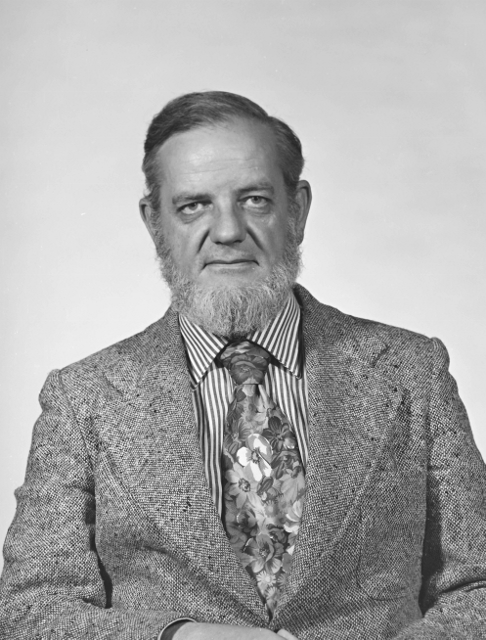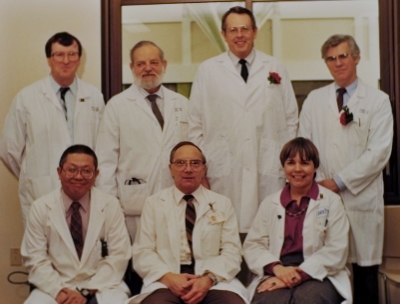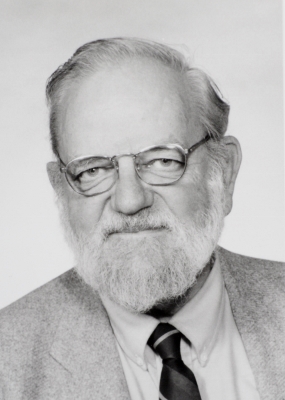
John B. Dossetor, professor emeritus of medicine and bioethics, 1971.
Life-or-death decisions fall on the shoulders of health professionals every day. Topics like informed consent, divergent religious beliefs and scarcity of life-saving donor organs are emotionally charged, understandably complicating decision-making when it comes to caring for the sick.
Just three decades ago health-care teams had minimal ethics training, but thanks to forward-thinking scholars like John Dossetor―founder of the University of Alberta's Bioethics Centre, later renamed the John Dossetor Health Ethics Centre―a national curriculum was developed to train physicians to grapple with the moral pitfalls of health care.
Dossetor, an award-winning professor emeritus of nephrology and bioethics at the Faculty of Medicine & Dentistry, Member of the Order of Canada and founding member of six Canadian health-care societies, has inspired generations of scholars at the U of A including today's UAlberta transplant leaders―Philip Halloran, Dossetor's successor as divisional director of nephrology and recent Prix Galien winner; James Shapiro, the leader of the original Edmonton Protocol islet transplant team, now investigating the use of stem cells during the transplantation procedure; and Lori West, director of the Alberta Transplant Institute and Canadian National Transplant Research Project.
The U of A currently ranks sixth in the world in transplantation according to the Center for World University Rankings. The U of A's rise in the transplant rankings is the result of decades of close collaboration between pioneering researchers like Dossetor andAlberta Health Services' physicians, nurses, lab pathologists and surgeons.
Dossetor, 93, has consulted on national health policies for issues like abortion, research ethics, HIV and AIDS treatment, blood and tissue donation, and end-of-life care. He has ignited discussions on social accountability and changed the face of medical education in Canada.
On August 22, 2018, his distinguished career will be honoured with a Canadian Medical Association (CMA) Medal of Service, one of the highest honours bestowed by the CMA.

Taking a gamble to save lives
In 1958, Dossetor made Canadian medical history at McGill University by coordinating the first kidney transplant from a living donor in Canada and the British Commonwealth. Nola Johnson was just 15 years old, and her gift granted 29 more years of life to her ailing twin sister, Moira. Nola's age posed an ethical dilemma. Could a minor consent to a procedure that could save her sister's life? And how long would the living donor live? At that time, these were questions without clear answers.
(Right: UAlberta Kidney Transplant Team - Top Row: Ray Ulan, John Dossetor, Rex Boake, William Lakey; Bottom Row: Thavisakdi (Ted) Kovithavongs, Kelvin Bettcher, Frances Harley. Courtesy of Medical Photography, University of Alberta Hospital)
Recognizing the need to raise awareness about the life-saving potential of kidney transplants, Dossetor simultaneously co-founded the kidney transplant program at McGill University, and the Kidney Foundation of Canada in 1964. Today, the Kidney Foundation of Canada has invested more than $115 million into life-changing research.
Armed with new knowledge and national research funding from the Medical Research Council (MRC) of Canada―now called the Canadian Institutes of Health Research (CIHR)―Dossetor was recruited to the U of A's Department of Medicine in 1969 as the divisional director of nephrology and immunology, where he established a longstanding tradition of research and mentorship.
Confronting the morality of caring for the sick
(Below: John Dossetor, 1985. Courtesy of Medical Photography, University of Alberta Hospital)

In 1984 to 1985, Dossetor studied with bioethics experts in San Francisco, Montréal and New York, leading him to become the first professor of bioethics at the U of A at the age of 60. His early ethics work promoted a spirit of collaboration in Alberta, where he championed initiatives like the Provincial Health Ethics Network. He acted as connector between organizations―including the University of Alberta Hospital, Alberta Health Services, the Alberta Association of Registered Nurses and the Capital Health Authority in order to establish professional standards of ethical research and patient care.
According to Dossetor's 2005 memoir, Beyond the Hippocratic Oath, ethical questions ought to evolve in tandem with new scientific discoveries, and are therefore never truly resolved.
"We should anticipate that our values will evolve further in the future," Dossetor wrote. "Just as we know they have evolved from the past. Indeed, we should welcome this moral uncertainty."
The challenges of selecting recipients for donated organs, sourcing eligible donors and assessing quality of life for patients are ever present in health-care professions, but with research driven by courageous hearts and curious minds like Dossetor's, advances in science are driving us toward innovative solutions.